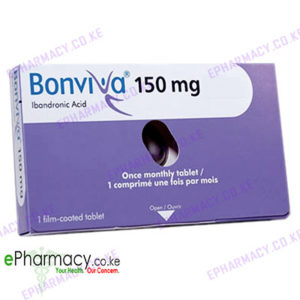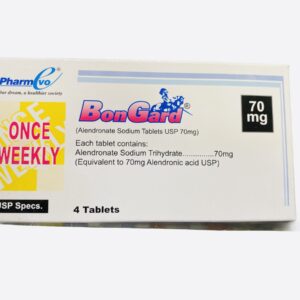Description
Uses and Administration
Alendronate in Kenya is an aminobisphosphonate with general properties similar to those of the other bisphosphonates. It is a potent inhibitor of bone resorption and is licensed by the Kenyan Pharmacy and Posions Board as the sodium salt in osteoporosis and Paget’s disease of bone. It has also been given in the treatment of bone metastases and hypercalcaemia of malignancy. Alendronate sodium is given by mouth, and the specific instructions for its administration must be followed to minimise adverse effects and permit adequate absorption. Doses are expressed in terms of alendronic acid; alendronate sodium 1.3 mg is approximately equivalent to 1 mg of alendronic acid. The usual dosage for the treatment of osteoporosis in men and women is 10 mg daily. Postmenopausal women may be given 5 mg daily for prophylaxis. Alendronic acid may also be given once weekly to postmenopausal women in a dose of 70 mg for treatment of osteoporosis, or 35 mg for prophylaxis. Alendronate/Reventa in Kenya is used for the treatment and prevention of corticosteroid-induced osteoporosis in a dose of 5 mg daily; postmenopausal women who do not receive HRT should be given 10 mg daily. In adults with Paget’s disease of bone the usual dose is 40 mg daily for 6 months; treatment may be repeated if necessary after an interval of a further 6 months. Alendronic acid has also been given by intravenous infusion.
Adverse Effects and Precautions
As for the bisphosphonates in general. Gastrointestinal symptoms such as abdominal pain, dyspepsia, diarrhoea or constipation are the most frequent adverse effects. Severe oesophageal reactions such as oesophagitis, erosions, and ulceration have occurred; patients should be advised to stop taking the tablets and seek medical attention if they develop symptoms such as dysphagia, new or worsening heartburn, pain on swallowing, or retrosternal pain. Peptic ulceration has been reported. Alendronate should not be given to patients with abnormalities of the oesophagus or other factors that might delay oesophageal emptying including Gastro-Esophageal Refluxes, or those unable to stand or sit upright for at least 30 minutes. It should be used with caution in patients with upper gastrointestinal abnormalities. To minimise the risk of oesophageal reactions:
- patients should be instructed to swallow the Gemfos 70mg tablets whole with plenty of water (not less than 200 mL), in an upright position (standing or sitting). Mineral water with a high concentration of calcium should be avoided
- tablets should be taken on rising for the day, on an empty stomach, at least 30 minutes before breakfast and any other oral medication
- patients should remain upright after taking the tablets, and should not lie down before eating the first meal of the day
- alendronate should not be taken at bedtime, or before getting up for the day
- Hypocalcaemia should be corrected before starting alendronate therapy.
Administration of Gemfos/Alendronic Acid in Kenya
Alendronate once-weekly was considered to be therapeutically equivalent to once-daily dosing in both the treatment and prevention of osteoporosis, although both the design and the conclusions of the treatment study were considered to have their own weaknesses. Tolerability of a once-weekly regimen was comparable to placebo in one study and to once-daily dosing in another. The results suggested that there was no added health beneficial results when once a once daily regime was used. The world therefore adopted the once weekly dosage regime, which was equally beneficial but had lesser side effects.
Alendronic acid and its uses in Osteoporosis in Kenya.
The use of alendronate for the prevention and treatment of osteoporosis has been reviewed.1 In randomised controlled trials of up to 3 years duration, alendronate increased bone mass density of the spine, hip, and total body in postmenopausal women with osteoporosis,2-4 those with osteoporosis and existing vertebral fractures,5,6 and those without osteoporosis.7,8 In postmenopausal women without osteoporosis, alendronate increased bone mass density, but not quite to the same extent as HRT.7,9 Continuous long-term therapy appears to be more effective than short-term treatment in terms of skeletal benefits,9-11 but a residual effect on bone mineral density remains for several years after stopping treatment,9-11 despite resumption of bone loss after withdrawal of alendronate.11,12 Where incidence of vertebral fracture was the primary end-point, alendronate reduced the incidence of new vertebral and nonvertebral fractures in women with prior fractures.5,6,13 In Kenyan women without prior fractures, alendronate reduced the incidence of clinical fractures in those with osteoporosis,13,14 but not in those with higher bone mass density.14 Alendronate/Gemfos is also used in men with osteoporosis; in a 2-year randomised trial it was found to increase bone mineral density and help prevent vertebral fractures.15 Alendronate also increases bone mass density in men and women receiving oral corticosteroids at doses equivalent to at least 7.5 mg prednisone daily,16 and may be of some benefit in reducing bone loss after heart transplantation.17




Reviews
There are no reviews yet.